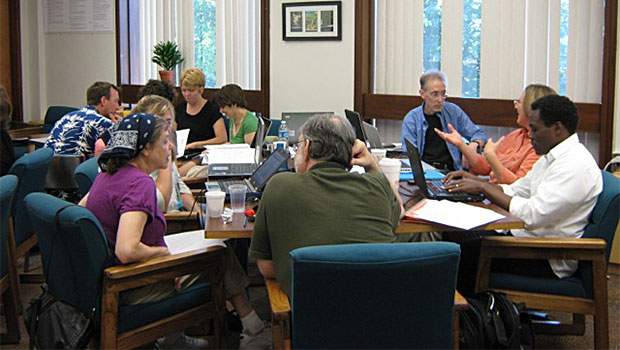Erica Jacobs teaches English at Oakton High School and writing at George Mason University. She had a B.A., M.A., and Ph.D. from Columbia University and has published numerous articles in local newspapers, newsletters, and magazines. This article is a reprint from her 1997 publication, “The Weekend Retreat.” Be on the look-out for her follow-up piece this February on her most recent participation in the WAC-sponsored Winter Faculty Writing Retreat that took place on January 7-8, 2015.
As a non-tenure track teacher at George Mason University, I was pleased to discover I was eligible to participate in a “Writing Retreat” sponsored by the English department and the Northern Virginia Writing Project in the fall of 1978. Don Gallehr had completed the first two summers of the Writing Institute with local high school teachers, and their success on the secondary level seemed to promise equal success on the University level.
That’s not, however, why I wanted to go on the retreat. It was a chance for a fully paid bucolic weekend at Airlie House in the Virginia countryside, away from my two-year-old and arriving in-laws. I wasn’t a writer, although I had taught writing for a few years. How bad could it be to write a little bit as my only responsibility for two days?
But that weekend turned out to be less of an escape and more of a coming home. I discovered that I am a writer, that I’d always been a writer and always would be. When Don Gallehr, Chris Thaiss, Marian Mohr, Don Humbertson and other “legends” of the Writing Project presented their workshops, I knew what those Airlie ducks felt like when they took to water.
We wrote, we read each others’ writing, we read aloud, and I wanted to do it all. I wrote about Mrs. Butcher in the second grade, being a mother, ballet, and teaching. We formed reading/writing groups which lasted a couple of years, and which I credit with encouraging me to finish my dissertation on Alfred Lord Tennyson. Who else but your mother or your reading/writing group loves you enough to read your dissertation?
Many articles have found their way into print with my name beneath the title in the years following that weekend. Now I am flattered when someone says, “Hey, I saw your article!” It’s enough to make me want to write another one on the sport, but that first time I was largely embarrassed by my pleasure in writing. Others were feeling equally self-conscious as they discovered voices in writing they never knew they had. No one had ever asked me to write before. That weekend I discovered the power of the simple request.
Many of us following the Airlie experience with the 1980 Faculty Writing Institute at George Mason University, which became a celebration of discovery through writing. Looking at the list of directors of George Mason’s most innovative programs, it seems no accident that several were there that weekend: Chris Thaiss, Director of Composition; John O’Connor, Director of New Century College; and Pat Story, Director of the PAGE program. Since that time I have continued to teach writing at George Mason, and for the past 12 years have expanded my teaching to Fairfax County high schools. Students on all levels tell me repeatedly that my class is most valuable when I force them to write. Just this last week a George Mason senior exclaimed, “I’ve never been in a class where the teacher wrote with the students and then read it aloud!”
The weekend retreat changed everything about my writing and teaching. I learned about research and practice during the Summer 1980 Faculty Writing Institute, but by then my “conversion” had already taken place. And even after 20 years the magic is there. It will always be there. Because what the Writing Project does is give writers the opportunity to say what they never knew they could or need to say – and that is a glorious moment for teacher and student.
Republished from The Virginia English Bulletin, Vol. 47, No. 2. Fall 1997

